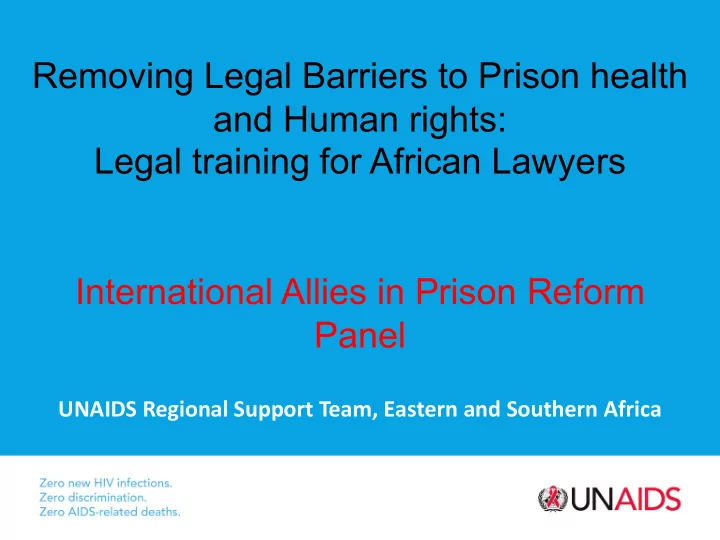

Removing Legal Barriers to Prison health and Human rights: Legal training for African Lawyers International Allies in Prison Reform Panel UNAIDS Regional Support Team, Eastern and Southern Africa
Closing the Gap • Ensure prisoners’ access to the health services available without discrimination • Adopt protective laws, policies and programs that are adequately resourced, monitored and enforced • Introduce a comprehensive package of interventions for HIV prevention, treatment and care in prisons and other closed settings • Provision of the full range of HIV services as part of prisons health services. • Peer support programs run by long-term prisoners/ex- prisoners. • After-release programs — establish links with prevention and care programs in the community.
What Interventions? • Availability of condoms, sterile syringe and needles and skin piercing equipment and promotion of consistent and correct use of condoms. • Access to drug treatment programs, especially drug substitution treatment, with adequate protection of confidentiality. • Access to HIV counselling and testing, antiretroviral and tuberculosis treatment and care and quality sexually transmitted infection treatment. • Review of drug control laws; provision of alternatives to imprisonment for minor drug-related offences; offer treatment for drug users instead of imprisonment. • Structural interventions to reduce overcrowding, pre-trial detention period and speedy trial and sentencing reform. • Separate accommodation and facilities for young prisoners.
What Interventions? ( continued ) • Providing condoms and water-based lubricants in prisons and closed settings, including in countries in which same-sex activity is criminalized • Adopting policies and strategies for the prevention, detection and elimination of all forms of violence • Offering harm-reduction programs, including opioid substitution therapy and needle and syringe programs • Reforming laws to ensure that people who are dependent on drugs, engage in sex work or have same-sex relations are not criminalized • Ensuring that people who are dependent on drugs can access voluntary treatment as an alternative to incarceration • Improving access to legal representation for people who have been detained and increasing the availability of non-custodial alternatives, including community service and bail
Recommend
More recommend